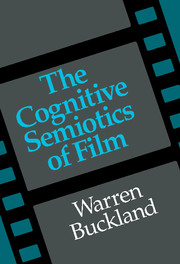Book contents
- Frontmatter
- Contents
- Preface and Acknowledgements
- 1 The Cognitive Turn in Film Theory
- 2 The Body on Screen and in Frame: Film and Cognitive Semantics
- 3 Not What Is Seen through the Window but the Window Itself: Reflexivity, Enunciation, and Film
- 4 The Institutional Context: A Semio-pragmatic Approach to Fiction and Documentary Film
- 5 All in the Mind? The Cognitive Status of Film Grammar
- Conclusion
- Notes
- Bibliography of Works Cited
- Index
5 - All in the Mind? The Cognitive Status of Film Grammar
Published online by Cambridge University Press: 02 December 2009
- Frontmatter
- Contents
- Preface and Acknowledgements
- 1 The Cognitive Turn in Film Theory
- 2 The Body on Screen and in Frame: Film and Cognitive Semantics
- 3 Not What Is Seen through the Window but the Window Itself: Reflexivity, Enunciation, and Film
- 4 The Institutional Context: A Semio-pragmatic Approach to Fiction and Documentary Film
- 5 All in the Mind? The Cognitive Status of Film Grammar
- Conclusion
- Notes
- Bibliography of Works Cited
- Index
Summary
The problem for the linguist … is to determine from the data of performance the underlying system of rules that has been mastered by the speaker-hearer and that he puts to use in actual performance. Hence, in the technical sense, linguistic theory is mentalistic, since it is concerned with discovering a mental reality underlying actual behavior.
(Noam Chomsky)My aim … is to argue for what I will gladly call a grammar of film, and adhere at the same time to a conception of scientific work broadly comparable to that of Metz (and [Sol] Worth), but advancing different theses as to the general nature of rules committed to representing this model of the structure of film.
(Dominique Chateau)One indication that linguistics has become a mature science is its ability to handle in a formalized manner the problem of ‘grammaticality’, or to define in formal terms the boundary between ‘grammatical’ and ‘ungrammatical’ sentences. A technical formulation of this boundary was one of Noam Chomsky's primary aims in his transformational generative grammar (TGG). We can claim that film theory has reached a relatively mature stage (in comparison with other disciplines in the humanities) thanks in part to attempts to develop a film ‘grammar’ based on Chomsky's early theories of TGG.
David Bordwell has expressed his surprise “that theorists who assign language a key role in determining subjectivity have almost completely ignored the two most important contemporary developments in linguistic theory: Chomsky's Transformational Generative Grammar and his Principles-and-Parameters theory.”
- Type
- Chapter
- Information
- The Cognitive Semiotics of Film , pp. 109 - 140Publisher: Cambridge University PressPrint publication year: 2000



